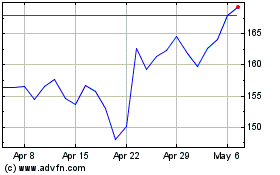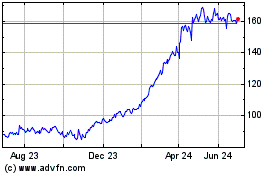Boeing Shifts to Microsoft's Azure Cloud Platform
July 18 2016 - 3:30PM
Dow Jones News
Boeing Co. and its AerData and Jeppesen subsidiaries will move
cloud-based versions of their aviation analytics applications, used
by more than 300 airlines, to Microsoft Corp.'s Azure cloud
computing platform.
Airlines use the apps to predict maintenance needs and optimize
fuel consumption.
Currently, airlines using the apps ran them primarily on their
own servers. Boeing has tinkered with cloud versions, using
platforms from Amazon.com Inc. and CenturyLink Inc., among others.
But the variety of cloud systems threatened to strain Boeing's
cloud-computing expertise, said Kevin Crowley, Boeing vice
president of digital aviation.
"It just became apparent that we needed to centralize around one
[cloud] technology," Mr. Crowley said.
Boeing will shift to Azure. Judson Althoff, Microsoft's
executive vice president of world-wide commercial business, said
that will allow Boeing to analyze a larger set of data provided by
the customer and other sources of information.
"You can drive more effective and more accurate models," Mr.
Althoff said.
The shift to cloud computing is part of the plane maker's lon-
term ambition to grow its commercial and military-services business
to about $50 billion in annual revenue by 2025, according to a
senior company executive, a massive expansion from its estimated
$15 billion today.
Cloud computing also reflects the increasing role of internet
connectivity aboard commercial aircraft. Once self-contained
islands of information and computing, airplanes are becoming nodes
on a global network, with pilots and airline staff adapting their
operations in real time as conditions change.
Over the long term, Boeing envisions a suite of applications
that could improve aircraft efficiency in real time, cutting fuel
consumption by around 10%.
Boeing had already begun rolling out the cloud-based software
with its Amsterdam-based subsidiary AerData and will complete its
transition more broadly over the next 12 to 24 months. Boeing
acquired AerData, which manages airplane and lessor maintenance
records, in 2014. The move to the cloud increases the ubiquity and
portability of records, often a key determinant of the continued
value of a commercial jetliner and the ease of remarketing an
aircraft for lease to its next operator.
Microsoft plans not only to provide the technical backbone for
the service but also to help Boeing sell the software. And
Microsoft's sales force will be compensated for Boeing customers'
use of Azure.
"This is very emblematic of the future for Microsoft," Mr.
Althoff said.
The deal helps Microsoft as it works to keep pace with the
leading provider of cloud infrastructure technology, Amazon.com
Inc.'s Amazon Web Services. Microsoft has worked its longstanding
relationships with large corporations, helping them make the shift
to the cloud, in an effort to catch up with AWS, which has used its
success with younger companies born in the cloud era to win over
those same corporate titans.
A week ago, Microsoft announced a partnership with General
Electric Co. to run its Predix software platform, which analyzes
data from industrial machinery, on Azure. Predix already runs on
Amazon Web Services.
The airline industry is rich with data to analyze, and Microsoft
rivals are also angling for pieces of the market. A month ago,
International Business Machines Corp. struck a deal with in-flight
wireless provider Gogo Inc. to alert airline pilots to turbulence,
using information from IBM's $2 billion acquisition of The Weather
Company.
Write to Jay Greene at Jay.Greene@wsj.com and Jon Ostrower at
jon.ostrower@wsj.com
(END) Dow Jones Newswires
July 18, 2016 15:15 ET (19:15 GMT)
Copyright (c) 2016 Dow Jones & Company, Inc.
GE Aerospace (NYSE:GE)
Historical Stock Chart
From Aug 2024 to Sep 2024

GE Aerospace (NYSE:GE)
Historical Stock Chart
From Sep 2023 to Sep 2024
